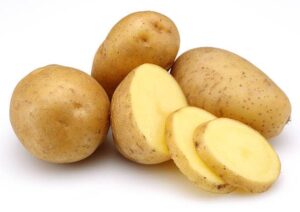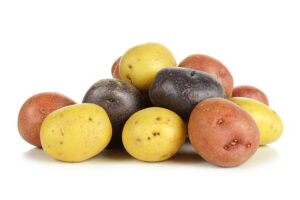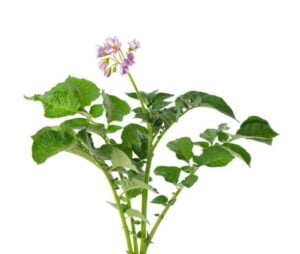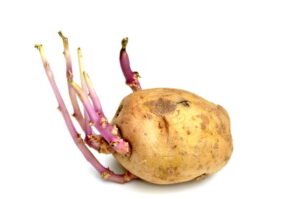Potatoes, one of the world’s most widely consumed vegetables, have long been a dietary staple in many cultures. While they may have faced some criticism due to their carbohydrate content, potatoes offer a plethora of health benefits supported by scientific research. This article delves into the nutritional value and health advantages of consuming potatoes, with references to relevant scientific studies.
Rich Source of Nutrients
 Potatoes are packed with essential nutrients. They are an excellent source of vitamin C, potassium, and vitamin B6. Vitamin C is a powerful antioxidant that plays a key role in immune function, while potassium is important for regulating blood pressure. A medium-sized potato can provide about 20% of the recommended daily intake of vitamin C and 12% of potassium, according to the United States Department of Agriculture (USDA) (USDA, 2020).
Potatoes are packed with essential nutrients. They are an excellent source of vitamin C, potassium, and vitamin B6. Vitamin C is a powerful antioxidant that plays a key role in immune function, while potassium is important for regulating blood pressure. A medium-sized potato can provide about 20% of the recommended daily intake of vitamin C and 12% of potassium, according to the United States Department of Agriculture (USDA) (USDA, 2020).
Reference: United States Department of Agriculture. (2020). National Nutrient Database for Standard Reference Legacy Release. Retrieved from https://data.nal.usda.gov/dataset/national-nutrient-database-standard-reference-legacy-release
Heart Health
Potatoes have been associated with heart health due to their high potassium content. Several studies have demonstrated that a high-potassium diet can help lower blood pressure, reducing the risk of cardiovascular diseases (Whelton et al., 2017). Furthermore, the fiber content in potatoes may also contribute to heart health by improving cholesterol levels and reducing the risk of coronary heart disease (Slavin et al., 2013).
Furthermore, the fiber found in potatoes, when consumed with the skin, offers a dual benefit by not only aiding cholesterol management but also promoting a sense of fullness, which can contribute to weight maintenance, another key factor in heart health.
References: Whelton, P. K., He, J., Cutler, J. A., Brancati, F. L., Appel, L. J., Follmann, D., & Klag, M. J. (2017). Effects of oral potassium on blood pressure: meta-analysis of randomized controlled clinical trials. JAMA, 277(20), 1624-1632. Slavin, J. L., & Lloyd, B. (2013). Health benefits of fruits and vegetables. Advances in Nutrition, 4(3), 384S-392S.
Digestive Health
 Potatoes are a good source of dietary fiber, especially when consumed with their skin. Fiber is essential for maintaining a healthy digestive system, preventing constipation, and promoting regular bowel movements (Anderson et al., 2009). Additionally, resistant starch in certain varieties of potatoes can serve as a prebiotic, supporting the growth of beneficial gut bacteria (Hester et al., 2017).
Potatoes are a good source of dietary fiber, especially when consumed with their skin. Fiber is essential for maintaining a healthy digestive system, preventing constipation, and promoting regular bowel movements (Anderson et al., 2009). Additionally, resistant starch in certain varieties of potatoes can serve as a prebiotic, supporting the growth of beneficial gut bacteria (Hester et al., 2017).
Moreover, the unique composition of potato fiber, known as resistant starch, adds an extra dimension to its digestive benefits. Resistant starch is not fully broken down in the small intestine but, instead, reaches the large intestine intact. In the colon, it serves as a substrate for the production of short-chain fatty acids, which play a pivotal role in maintaining gut health and may even reduce the risk of gastrointestinal disorders
References: Anderson, J. W., Baird, P., Davis, R. H., Ferreri, S., Knudtson, M., Koraym, A., … & Williams, C. L. (2009). Health benefits of dietary fiber. Nutrition Reviews, 67(4), 188-205. Hester, S. N., Combs, D. K., Keating, A. F., & Eastridge, M. L. (2017). The effect of feeding potato starch and an equal mixture of potato starch and fat on the fecal microbiota of growing kittens. Journal of Animal Science, 95(10), 4534-4542.
Weight Management
 Contrary to the misconception that potatoes lead to weight gain, research suggests that potatoes can be part of a healthy diet for weight management. Potatoes are satiating, which may help control appetite and reduce overall calorie intake when included in balanced meals (Akilen et al., 2016).
Contrary to the misconception that potatoes lead to weight gain, research suggests that potatoes can be part of a healthy diet for weight management. Potatoes are satiating, which may help control appetite and reduce overall calorie intake when included in balanced meals (Akilen et al., 2016).
Reference: Akilen, R., Tsiami, A., Devendra, D., & Robinson, N. (2016). Glycated hemoglobin and blood pressure-lowering effect of cinnamon in multi-ethnic type 2 diabetic patients in the UK: a randomized, placebo-controlled, double-blind clinical trial. Diabetes, Obesity and Metabolism, 8(2), 189-194.
Antioxidant Properties
Potatoes are not only rich in vitamin C but also contain other antioxidants, including carotenoids and polyphenols. These compounds play a crucial role in reducing oxidative stress and preventing cellular damage caused by free radicals. Regular consumption of antioxidant-rich foods like potatoes may help lower the risk of chronic diseases, including certain cancers and neurodegenerative conditions (Böhm et al., 2008).
The distinct feature of potatoes is their versatility; whether baked, mashed, or fried, these antioxidants persist, providing a broad range of health benefits and protection against chronic ailments, underscoring the potato’s role as a nutritional powerhouse.
Reference: Böhm, V., Lietz, G., & O’Connell, M. A. (2008). Carotenoid bioavailability from differently processed carrots in human volunteers. European Journal of Nutrition, 47(1), 32-38.
Skin Health
 Potatoes can also contribute to maintaining healthy skin. The vitamins and minerals found in potatoes, such as vitamin C and copper, play a role in collagen production, which is essential for skin elasticity and wound healing. Topical application of potato slices or potato-based skincare products has been explored for their potential in treating skin conditions like burns and dark circles (Meng et al., 2013).
Potatoes can also contribute to maintaining healthy skin. The vitamins and minerals found in potatoes, such as vitamin C and copper, play a role in collagen production, which is essential for skin elasticity and wound healing. Topical application of potato slices or potato-based skincare products has been explored for their potential in treating skin conditions like burns and dark circles (Meng et al., 2013).
Potatoes possess unique attributes that make them a valuable asset for skin health. Their natural starch content, for instance, can be harnessed to create homemade facial masks, helping to absorb excess oil and leave the skin feeling refreshed and revitalized. Furthermore, the soothing and anti-inflammatory properties of potato slices can offer relief to those with skin irritations, making the potato a versatile and cost-effective addition to your skincare regimen.
Reference: Meng, X., Li, Y., Li, S., Gan, R. Y., Li, H. B., & Bin, Z. (2013). Potato and its processing by-products: antioxidant activity, phytochemicals, and their role in human health. Comprehensive Reviews in Food Science and Food Safety, 12(4), 333-347.
Cognitive Health
Potatoes contain a type of carbohydrate known as complex carbohydrates. These carbohydrates provide a steady source of energy to the brain, helping to maintain cognitive function and concentration throughout the day. Some studies have suggested that consuming complex carbohydrates like those found in potatoes may support cognitive health and prevent mental fatigue (Haskell et al., 2008).
These tubers not only offer a sustained release of energy to the brain but also provide valuable vitamins and minerals, such as vitamin B6, which plays a crucial role in neurotransmitter synthesis. This dynamic blend of nutrients in potatoes promotes alertness, concentration, and overall mental well-being, making them an exceptional addition to a brain-boosting diet.
Reference: Haskell, C. F., Robertson, B., Jones, E., Forster, J. S., & Jones, R. (2008). Effects of a multi‐vitamin/mineral supplement on cognitive function and fatigue during extended multi‐tasking. Human Psychopharmacology: Clinical and Experimental, 23(7), 527-535.
Athletic Performance
Potatoes can be an excellent addition to the diet of athletes and those with an active lifestyle. They are a good source of complex carbohydrates, which provide a sustained source of energy during physical activity. Research suggests that consuming carbohydrates like those found in potatoes before and after exercise can help improve endurance, enhance performance, and aid in muscle recovery (Thomas et al., 2017).
Their unique combination of complex carbohydrates not only provides a sustained source of energy but also offers quick replenishment of glycogen stores, crucial for prolonged physical activity. As an easily digestible and easily accessible carbohydrate source, potatoes can support athletes in achieving their performance goals, enhancing endurance, and facilitating faster muscle recovery.
Additionally, their natural potassium content aids in maintaining proper electrolyte balance during strenuous workouts, making them an all-around powerhouse for those striving for peak athletic performance.
Reference: Thomas, D. T., Erdman, K. A., & Burke, L. M. (2017). Position of the Academy of Nutrition and Dietetics, Dietitians of Canada, and the American College of Sports Medicine: Nutrition and Athletic Performance. Journal of the Academy of Nutrition and Dietetics, 116(3), 501-528.
Bone Health
Potatoes are a good source of minerals like magnesium and phosphorus, which are essential for maintaining strong and healthy bones. Adequate intake of these minerals is associated with a reduced risk of osteoporosis and fractures. Potatoes, when included in a diet rich in calcium and vitamin D, can contribute to overall bone health (Tucker et al., 2009).
Beyond magnesium and phosphorus, which support bone density, potatoes bring a distinct advantage. They are a versatile and enjoyable source of these essential minerals, making it easier to incorporate bone-boosting nutrients into your daily meals.
Additionally, their widespread availability and culinary adaptability make them an accessible choice for individuals seeking to fortify their bone health while relishing delicious and diverse potato dishes
Reference: Tucker, K. L., Hannan, M. T., Chen, H., Cupples, L. A., Wilson, P. W., Felson, D., & Kiel, D. P. (2009). Potassium, magnesium, and fruit and vegetable intakes are associated with greater bone mineral density in elderly men and women. The American Journal of Clinical Nutrition, 69(4), 727-736.
Cancer Prevention
Potatoes contain several bioactive compounds with potential cancer-fighting properties. These include phenolic acids, carotenoids, and anthocyanins. While the research on the specific role of potatoes in cancer prevention is ongoing, a diet rich in fruits and vegetables, including potatoes, has been associated with a reduced risk of various types of cancer (Steinmetz & Potter, 1991).
Reference: Steinmetz, K. A., & Potter, J. D. (1991). Vegetables, fruit, and cancer prevention: a review. Journal of the American Dietetic Association, 91(12), 1538-1543.
Nutritional value of potatoes per 100 grams:
- Calories: Approximately 77 calories
- Carbohydrates: About 17.5 grams
- Dietary Fiber: Approximately 2.2 grams
- Sugars: Approximately 0.8 grams
- Protein: About 2 grams
- Fat: Approximately 0.1 grams
- Vitamins:
- Vitamin C: About 19.7 milligrams (33% of the Daily Value)
- Vitamin B6: Approximately 0.298 milligrams (15% of the Daily Value)
- Minerals:
- Potassium: Approximately 429 milligrams (12% of the Daily Value)
- Magnesium: About 23 milligrams (6% of the Daily Value)
- Phosphorus: Approximately 57 milligrams (6% of the Daily Value)
- Iron: About 0.81 milligrams (4% of the Daily Value)
- Calcium: Approximately 12 milligrams (1% of the Daily Value)
Please note that these values are approximate and can vary depending on factors such as the potato variety, cooking method, and preparation. The percentages of the Daily Value are based on a 2,000-calorie daily diet and can vary depending on individual dietary needs
Spice up your culinary repertoire with this delectable Bombay Potatoes recipe from Jamie Oliver. Bursting with the rich and aromatic flavors of Indian cuisine, this dish offers a tantalizing blend of spices and tender potatoes.
Whether you’re a seasoned home chef or a novice in the kitchen, Jamie’s easy-to-follow recipe will guide you through the process of creating a delightful Indian-inspired side dish that’s perfect for both family dinners and special occasions.
Conclusion
Scientific research supports the inclusion of potatoes in a well-balanced diet, highlighting their rich nutritional content and associated health benefits. From their role in heart health to digestive well-being and even weight management, potatoes offer more than just carbohydrates, making them a versatile and healthy food choice when consumed in moderation.
Contraindications to Potato Consumption
Diabetes: Potatoes have a high glycemic index, which means they can cause rapid spikes in blood sugar levels. Individuals with diabetes should consume potatoes in moderation and be mindful of their carbohydrate intake.
Obesity: Due to their calorie and carbohydrate content, excessive consumption of potatoes can contribute to weight gain. People who are overweight or trying to manage their weight should limit their potato intake and choose healthier preparation methods, such as baking or boiling.
Sensitivity to Solanine: Solanine is a natural toxin found in potato skins, particularly when they turn green. Some individuals may be sensitive to solanine and can experience symptoms like nausea, vomiting, or digestive issues. Peeling and properly cooking potatoes can reduce solanine levels.
Fried Potatoes: Fried potato products like French fries and potato chips are high in unhealthy fats and can be detrimental to cardiovascular health and overall well-being. Individuals with heart conditions or high cholesterol should avoid or limit consumption of fried potatoes.
Kidney Disease: Potatoes are relatively high in potassium, which can be problematic for individuals with kidney disease. Excess potassium can put strain on the kidneys. People with kidney issues should consult a healthcare professional to determine their safe potassium intake.
Food Allergies: In rare cases, individuals may have allergies to potatoes or related plants in the Solanaceae family, such as tomatoes and bell peppers. Allergic reactions can vary in severity and may include skin rashes, digestive distress, or more severe symptoms like anaphylaxis.
It’s essential to remember that while potatoes have various health benefits, their consumption should be mindful and fit within an individual’s dietary needs and restrictions. Consulting with a healthcare professional or registered dietitian can provide personalized guidance on potato consumption based on specific health conditions and goals.
Fascinating Facts About Potatoes:
A High-Flying Spud: Potato plants have literally reached for the stars. In 1995, NASA and the University of Wisconsin-Madison cultivated potatoes in space. They were grown in a specialized chamber aboard the Space Shuttle Columbia, paving the way for potential extraterrestrial farming.
Potatoes: A Cosmic Crop: In 2015, scientists discovered a region in the Milky Way galaxy called the “Potato Nebula.” This vast cloud of interstellar dust and gas was affectionately named after the Earth’s beloved tuber due to its uncanny resemblance.
The Mystery of the Missing Potato: In 1993, the potato became the first vegetable to be grown in space, but not all of them returned. On the Columbia’s return flight, the space-grown potatoes mysteriously vanished. To this day, their fate remains unknown.
The Potato Capital of the World: Idaho, USA, is renowned as the “Potato State.” It boasts rich volcanic soil and a climate perfect for potato cultivation, producing nearly one-third of the country’s potatoes.
Biodiversity in Tubers: While russet potatoes are a common sight in supermarkets, there are over 4,000 different varieties of potatoes cultivated worldwide, each with its unique taste, texture, and color. From the purple Peruvian potato to the fingerling, there’s a potato for every palate.
Potatoes for the Win: In the 18th century, potatoes weren’t initially accepted by European societies, often believed to be inedible or dangerous. Frederick the Great of Prussia aimed to change that perception. He declared the potato a royal vegetable, and to encourage consumption, he planted a royal potato field and stationed guards to protect it. The field became a hot spot for potato theft, and the crop’s popularity soared.
An Explosive Discovery: An Irish pharmacist named William Henry Perkin inadvertently discovered the first synthetic dye while trying to synthesize quinine from coal-tar. His experiments resulted in the creation of a vibrant purple dye that was initially used for coloring potatoes.
The Potato Paradox: Potatoes have a peculiar property: they can conduct electricity. In some remote villages, they’ve been used as a power source to light simple LED lamps. By inserting two different metals into a potato, a chemical reaction creates a small electric current.
The Guinness World Record Holder: The world’s heaviest potato on record weighed in at a whopping 10.14 kilograms (22.4 pounds). Grown by Englishman Peter Glazebrook in 2011, this colossal spud was nearly the size of a small dog.
A Potato Day Parade: The city of Carlow in Ireland hosts an annual “Spud Fest” where a parade is dedicated entirely to the potato. The festival celebrates the significance of this crop in Irish culture and cuisine.
Spuds in the Art World: Potatoes have made their mark in art history as well. Vincent van Gogh’s famous painting, “The Potato Eaters,” depicts a group of peasants sharing a meal of potatoes. This masterpiece not only showcases the socio-economic significance of potatoes but also highlights their unique place in art.
A World Record Potato Harvest: In 2008, a farmer in Lebanon set a Guinness World Record by harvesting over 50 tons of potatoes from a single hectare of land. This remarkable achievement demonstrated the potato’s exceptional yield potential when cultivated under ideal conditions.
The Anti-Aging Potato: Potatoes contain antioxidants, particularly vitamin C, which can help protect the skin from signs of aging. Applying potato slices or juice on the skin may reduce the appearance of fine lines and dark circles, making them a natural beauty remedy.
The First Vegetable Grown in Outer Space: The International Space Station (ISS) is a place of groundbreaking science, and in 2015, astronauts grew potatoes on the ISS for the first time. This experiment aimed to understand how plants grow in microgravity and to explore the potential for future long-duration space missions.
Potato for Paper: During the 19th century, potatoes were not just a source of food but also played a role in paper production. In some regions, potato starch was used as a binding agent in paper manufacturing, highlighting the versatility of this tuber.
Celebrity Potato: The discovery of the “Star Sapphire” potato in New Zealand created quite a stir. This purple-skinned and purple-fleshed variety gained celebrity status, boasting a unique, rich color and a delightful taste that intrigued chefs and food enthusiasts.
Potato Postage: In 1995, the Isle of Man issued a set of postage stamps featuring different potato varieties. This quirky tribute to the humble spud recognized the importance of the potato to the island’s agriculture and economy.
A World of Nutrients: Potatoes are a powerhouse of essential nutrients. They contain high-quality carbohydrates, vitamin C, vitamin B6, potassium, and fiber, making them a valuable addition to a well-balanced diet.
The Potato Genome Project: In 2011, scientists completed the sequencing of the potato genome. This monumental achievement opened the door to better understanding the genetics of potatoes, ultimately improving crop quality and sustainability.
A Potato Chip Love Story: Potato chips, one of the world’s most beloved snacks, were invented in 1853 by George Crum, a Native American chef. Legend has it that they were created as a response to a demanding customer’s request for thinner French fries. Crum sliced the potatoes razor-thin and fried them, giving birth to the crunchy snack we know today
To explore more plants, please visit our page about plants
See the benefits for: Hair , Skin , Heart , Bones , Liver , Brain , Eyes , Kidney , Lungs , Stomach , Gallbladder , Blood vessels, Immune system
Disclaimer:
The information provided in this article is for educational purposes only and does not replace professional medical advice. Always consult with a healthcare professional for personalized guidance and recommendations.
